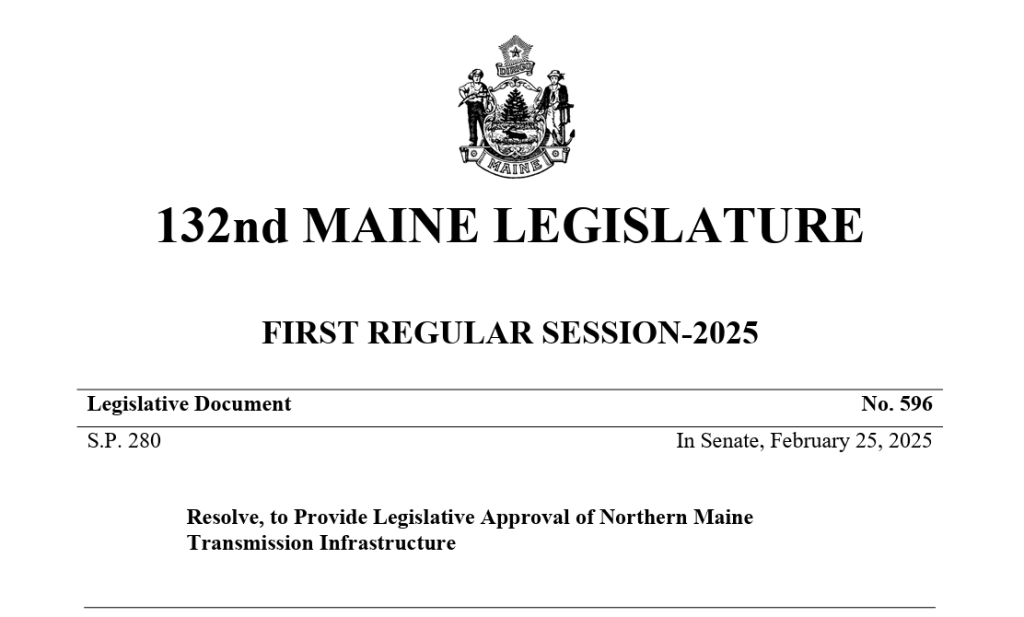LD 596, Resolve, to Provide Legislative Approval of Northern Maine Transmission Infrastructure

Senator Lawrence, Representative Sachs, and Members of the Energy, Utilities, and Technology Committee:
Preserve Rural Maine writes to express our opposition to LD 596.
I am writing on behalf of Preserve Rural Maine, an organization dedicated to protecting the communities, cultures, and environment of rural Maine. Our mission is to ensure that rural communities, particularly those that are socioeconomically disadvantaged, have a seat at the table in decisions that will shape their future. We work to safeguard Maine’s rural landscapes—its forests, farmland, and natural resources—which are not only vital to the local economy but also to the cultural fabric of our state. As such, we strongly oppose LD 596, a bill that would approve the construction and operation of a high-impact transmission line to connect renewable energy resources in northern Maine to the electric grid operated by the New England Independent System Operator.
In rural Maine, we take pride in our connection to the land and the resources that sustain us. The bill seeks to approve a high-impact transmission line without answering the crucial questions of its community, economic, and environmental impacts. It bypasses the necessary legislative review processes, leaving our communities at risk of being disproportionately affected by a project they had no meaningful say in. It threatens to undermine the very qualities that make rural Maine special.
The bill proposes approval for a project that is still shrouded in uncertainty. We do not know the specifics of the route, the developer, the design, or the potential costs and benefits. In fact, there is no clear plan on the table that would allow us to evaluate the potential impact of this transmission line on our communities. The absence of critical information is troubling. How can we approve a project of this scale without fully understanding its scope, design, and consequences? Approving such a project without these details goes against the principles of transparency and accountability that are vital to good governance.
Additionally, the potential community and environmental impacts are deeply troubling. Rural Maine is home to some of the state’s most pristine and valued landscapes. The construction and operation of a high-impact transmission line could permanently alter the character of these areas, damaging the environment and disrupting local economies that rely on tourism, agriculture, and natural resources. Furthermore, the environmental impact of such a massive construction project has not been adequately addressed. What are the potential effects on local wildlife, water quality, and natural habitats? What measures will be taken to minimize the environmental footprint? We have no answers to these vital questions, and yet the bill pushes ahead for the legislature to approve a project that could irrevocably harm the land we cherish.
For rural homeowners, the value of their property is often their largest financial asset. The introduction of a high-voltage transmission line through their land will inevitably reduce property values. This is a reality that has been observed in similar projects across the country. Families who rely on their land for agricultural or recreational use will find their ability to use and enjoy it severely restricted. For many, this represents a permanent loss that they cannot afford to absorb. This bill seeks to authorize a project that will strip rural communities of the value they have spent generations building.
In addition to the loss of property value and environmental degradation, rural communities could face disruption in their daily lives. This project could result in the destruction of farmland, forests, and community spaces that are vital to our way of life. The construction and operation of this transmission line could interrupt the local economies that rely on natural resources, tourism, agriculture, and forestry. Communities in these areas are not only concerned about the loss of their property value but about the long-term environmental and cultural degradation that this project could cause. Additionally, the roads, equipment, and infrastructure necessary for such a project could permanently alter the landscape and create long-term logistical burdens for residents. Rural communities often lack the resources to mitigate these disruptions, and once the transmission line is built, it will be too late for residents to reverse the damage.
While we fully support the transition to renewable energy and the importance of investing in energy infrastructure, we believe this bill fails to address critical concerns about the impact on rural communities, property values, and the environment. As an organization that represents the voices of Maine’s rural residents, we are deeply concerned about the consequences this project will have on the very communities and landscapes we work to protect.
For all these reasons, we respectfully ask the committee to reject LD 596. We urge you to prioritize the protection of Maine’s rural communities and their way of life by ensuring that any future development—especially those that could have such a profound impact—are transparent, well-vetted, and fully considerate of the people and places they affect, and then allow the legislature the opportunity to vote on the merits of the development.
Thank you for your time and consideration.
Sincerely,
Tanya Blanchard
President
Preserve Rural Maine
tanya@PreserveRuralMaine.org

Leave a Reply